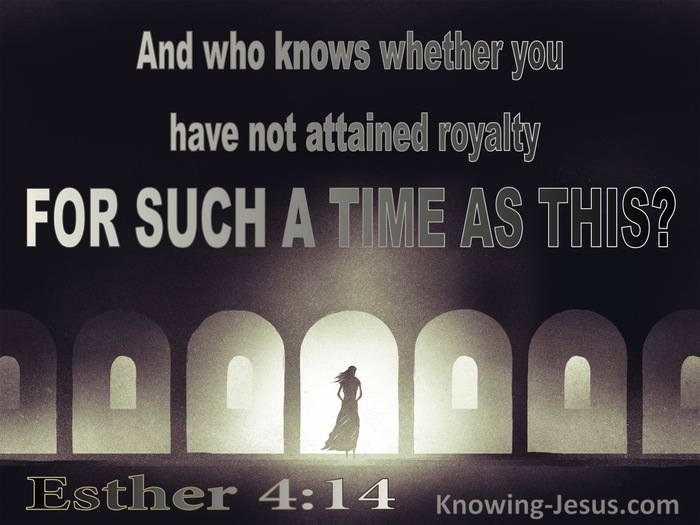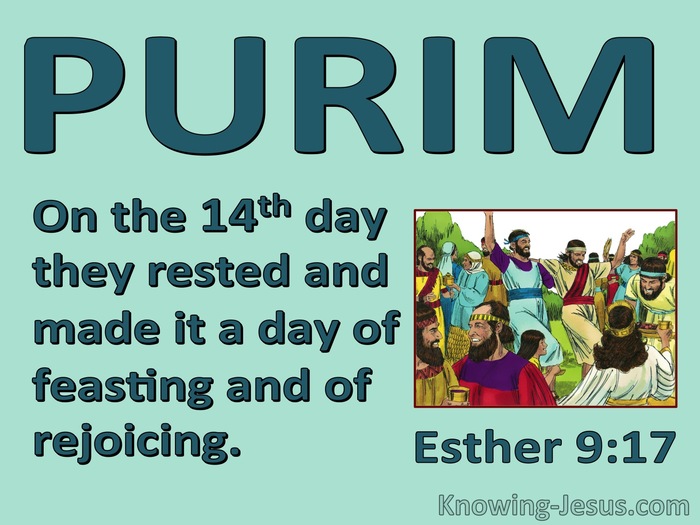7 Bible Verses about Purim
Most Relevant Verses
Indeed, if you are silent at this time, relief and deliverance will come to the Jewish people from another place, but you and your father's family will perish. Who knows but that you were brought to the kingdom for a time like this?"
The king said, "Hang him on it." So they hanged Haman on the pole he had set up for Mordecai, and then the king's anger subsided.
What the king granted the Jewish people in every town was the right to assemble and defend themselves, to annihilate, kill, and destroy every armed force of a people or a province that was hostile to them, including children and women, and to plunder their property.
Therefore these days were called , from the word . Because of all that was written in this letter, because of what they experienced in this matter, and because of what happened to them,
They did this on the thirteenth day of Adar and rested on the fourteenth day, making it a day of feasting and joy. The Jewish people in Susa assembled on the thirteenth day and again on the fourteenth, and then rested on the fifteenth day and made it a day of feasting and joy. Therefore the Jewish people in the rural areas who live in unwalled towns make the fourteenth day of the month Adar a holiday for joy and feasting, and people send presents to one another.
the Jewish people established this celebration, making it a tradition for themselves, for their descendants, and for all who joined with them that they should not fail to observe these two days each year, based on the written instructions, and at the prescribed time.
In the twelfth year of the reign of King Ahasuerus, in the first month (the month Nisan), the (that is, the lot) was cast in Haman's presence to determine the best day and month to carry out his plot. The lot indicated the twelfth month, the month Adar.
From Thematic Bible
Purim » Feast
Mordecai wrote these instructions and sent letters to all the Jewish people in all the provinces of King Ahasuerus, both near and far, establishing that they should celebrate the fourteenth and fifteenth days of the month Adar every year, as the days on which the Jewish people enjoyed relief from their enemies. It was a month when things turned around for them, from sorrow to joy and from mourning to a holiday. They were to celebrate these days as days of feasting and joy, and they were to send presents to one another and gifts to the poor. read more.
So the Jewish people made a tradition out of what they had begun to do and of what Mordecai had written to them, since Hammedatha's son Haman, the enemy of the Jewish people, had plotted against the Jewish people to destroy them, and he had cast the (that is, the lot) to determine when to confuse and destroy them. But when Esther came before the king, he ordered through a letter that the evil plot that Haman had devised against the Jewish people be rescinded, and that he and his sons be hanged on poles. Therefore these days were called , from the word . Because of all that was written in this letter, because of what they experienced in this matter, and because of what happened to them, the Jewish people established this celebration, making it a tradition for themselves, for their descendants, and for all who joined with them that they should not fail to observe these two days each year, based on the written instructions, and at the prescribed time. These days should be remembered and observed in every generation by each family in every province and town. These days of Purim should not be neglected by the Jewish people, and that they should not be forgotten by their descendants. Queen Esther, the daughter of Abihail, and Mordecai the Jew wrote with full authority confirming this second letter about Purim. Letters containing wishes for peace and stability were sent to all the Jewish people, to the 127 provinces of Ahasuerus' kingdom, establishing these days of Purim at the prescribed time, just as Mordecai the Jew and Queen Esther had established, and just as the Jewish people had established for themselves and for their descendants. The letter included instructions for their fasting and lamentations. The order of Esther established these instructions for Purim, and it was officially recorded.

